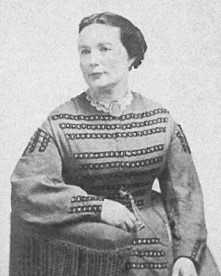Eliza Potter - A Life Between Two Worlds
Born: 1820, Cincinnati, Ohio, U.S.A.
Died: 1893
Eliza Potter was a courageous and resourceful Black businesswoman who used her success and unique position to aid others and challenge injustice.
Eliza began traveling at an early age, using her talents as a hairdresser to work for wealthy white women. These jobs took her from place to place, and she became popular among her clients. By 1860, Eliza was one of only four Black female hairdressers in Cincinnati. Hairdressing was rare for African American women, and her skill made her highly valued. She was paid well for her work, which allowed her to live more comfortably than many others in her community. At her death, Eliza owned property worth about $2,400, a significant amount for a woman of color at that time.
While Eliza’s career gave her financial security, it also placed her in a unique position. Because of her light skin, she was sometimes able to pass in white spaces, which gave her more freedom than many African Americans. This privilege also created distance between her and much of the Black community in Cincinnati. Some in the community saw her as separate, and she often spent her time in circles that were mainly white. Even so, she used her position to help others.
For example, Eliza once worked for a wealthy southern woman who owned enslaved people. During her time with this client, Eliza tried to convince her to free one of the women she enslaved and her young child. This showed Eliza’s courage and her willingness to use her influence to help those with fewer rights. Though she did not always work directly with the larger Black community, she found ways to use her unique access to benefit others.
Eliza was also involved in important organizations. She served as a trustee for the Colored Orphan Asylum in Cincinnati and worked with other respected figures, such as Catherine Coffin, who was part of the Underground Railroad. As a “lady manager” of the orphanage, Eliza helped care for children who had lost their families. She also supported fugitive enslaved people who came through the city seeking freedom, and records suggest she was even arrested once for assisting them. These acts connect her to the same causes supported by the Cincinnati Colored Convention of 1858, which focused on advancing the rights of free and enslaved African Americans.
Even though Eliza may not have been deeply connected to the convention itself, her life reflected some of the same goals. She worked to improve the lives of African Americans, especially those in vulnerable situations, and used her resources to do so. She was not always socially accepted in the Black community, but her contributions still mattered.
Eliza’s story also gives us a rare glimpse into the life of a wealthy Black businesswoman during the 19th century. At a time when many African Americans, and especially women, had few opportunities to earn money, she built a business, earned the respect of her clients, and used her success to help others. She balanced her career with her responsibilities as a mother, though little is known about her family life since she rarely spoke about her husband or children.
In many ways, Eliza Potter lived between two worlds. Her light skin and profession allowed her access to white society, while her heritage and commitments tied her to the struggles of African Americans. This complicated position sometimes isolated her, but it also gave her power to act in ways others could not. She did not waste that opportunity.
Eliza’s life shows the impact one woman could make by using her talents and her circumstances to create change. Through her work as a hairdresser, her support of orphans, and her quiet but courageous efforts to aid enslaved people, she left a legacy of strength, independence, and compassion.
References:
“Eliza Potter.” Colored Convention Heartland: Black Organizers, Women and the Ohio Movement, 25 Feb. 2021, coloredconventions.org/ohio-organizing/biographies/eliza-potter/.
“Eliza Potter: ‘[A] Noble, Patriotic Heart’ - Surgeon’s Call Article.” National Museum of Civil War Medicine, 30 June 2023, www.civilwarmed.org/surgeons-call/potter/.
Santamarina, Xiomara, and Eliza Potter. “A Hairdresser’s Experience in High Life.” Project MUSE, The University of North Carolina Press, muse.jhu.edu/book/19116/.
Key words:
Civil Rights, Justice, Courage, Perseverance, Responsibility, Selflessness, Challenge Injustices, Make a Difference
View Discovery Award projects about this Unsung Hero:
Eliza Potter - Discovery Award 2017
- Collections: Art Gallery, Unsung Heroes

